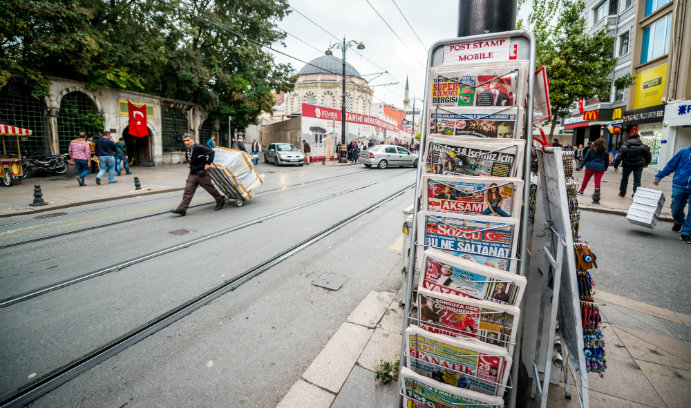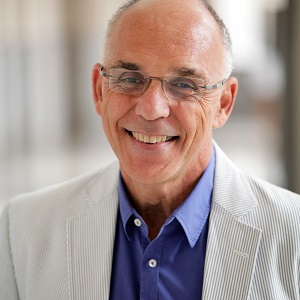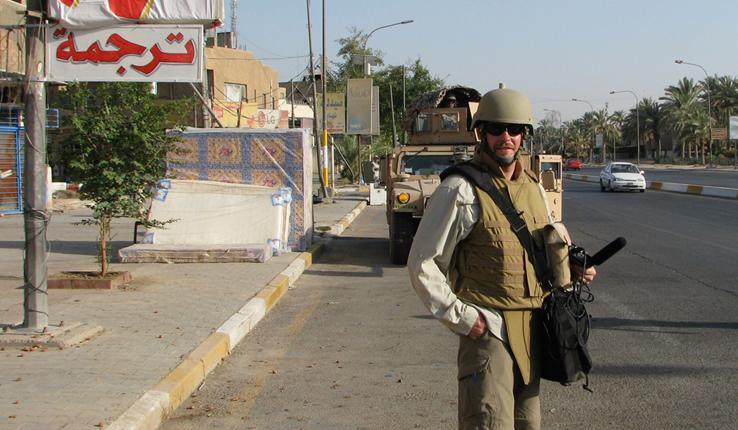Q&A: Henri Barkey on Turkey's 'Fake News' Campaign Against Him

Newspapers for sale on an Istanbul street, Turkey. According to a 2016 Human Rights Watch report, Turkey’s government has all but silenced independent media in an effort to prevent scrutiny or criticism of its ruthless crackdown on perceived enemies. (Credit: iStock/anouchka)
Astonishingly, longtime International Relations faculty member Henri Barkey has been the target of a Turkish government campaign that falsely claims he was involved in a failed coup attempt on July 15, 2016.
The aftermath of the coup has ushered in a brutal crackdown by Turkish President Recep Tayyip Erdogan’s government, which is said to have opened investigations into several prominent U.S. figures including Senator Chuck Schumer, former U.S. Attorney for the Southern District of New York Preet Bharara, former CIA Director John Brennan and Barkey for alleged involvement.
Last month, the Turkish press reported that a warrant had been issued for Barkey’s arrest.
1. How does it feel to be thrust into the international spotlight accused of leading a coup attempt against the current leadership of Turkey?
This has now been going on for almost a year and a half. Ever since the failed coup in Turkey, there has been a government-sponsored campaign of defamation. The charges are so absurd that you want to laugh; they invented a series of stories, details that are supposed to make their claims credible yet it takes the whole thing to another realm that at best can be described as surreal. These include conversations I did not have and a little bell with an inscription that says “Pennsylvania” I supposedly left behind.
They recently have re-intensified the campaign; apparently they have issued an arrest warrant issued for me. More worrisome is that people with whom I have little connection or are simply acquaintances of mine are being arrested, accused of simply knowing me, as is the case with a well-known philanthropist imprisoned a few weeks ago. They have also issued a warrant for a friend of mine with whom I had co-authored a book claiming that he was on the island with me. He, they say, escaped on a helicopter with mutineers towards Greece from the island. For the record, at the time of the coup, Graham Fuller was near Vancouver, Canada, where he lives. So to put it mildly, this is an unpleasant situation to be in.
In the end, I take solace at the thought and knowledge that the Turkish government and the media it dominates look small and have become the object of ridicule as no serious foreign government official or informed person believes their fantasies. It is the credibility of the Turkish government and its press that is being eroded daily. This comes with some cost to me personally, of course, as the issue risks becoming a political football at times involving an increasingly frustrated U.S. Government.
2. What do you believe is behind the accusation? In other words, why do you think you have been singled out and accused?
The Turkish government initiated the accusations based on the fact that I was on an island 45 minutes away from Istanbul running a workshop on Middle Eastern countries' reaction to Iran and the nuclear agreement signed with the U.S. and others. Initial reports in the press had very specific details regarding my entry and exit into the country that only a Turkish government agency would have access to.
The purpose of blaming me was to connect the United States to the coup attempt. Having served at the State Department and also because I have had some visibility in the policy discussions in Washington, accusing me was a convenient way to put pressure on the U.S. In fact, the narrative that has been developed since the coup by the Turkish government and its minions in the press has been this consistent argument that the coup was organized by the U.S. This helps the Turkish government develop a nationalist, anti-foreigner and anti-U.S. discourse designed to demonstrate to its public that it has been valiantly defending the homeland from these rapacious powers. The paradox, of course, is that the U.S. and Turkey have since 1952 been allies and members of the same alliance, NATO.
3. How has being a target of this "fake news" campaign impacted your life and work?
The impact has been unfortunate and yet simultaneously gratifying. Some people have distanced themselves, including a few close friends, and some institutions that should have come to my defense sadly did not. Yet, lots of people, including many I did not know very well, have jumped to offer their support, help and, of course, to publicly denounce these ridiculous charges.
In terms of my work, I clearly cannot go to Turkey anymore and even to countries that are politically close to Turkey. This will hamper my ability to continue my research by denying me access to Turkey and even sources who will, understandably, be wary of being seen communicating with me. If being my acquaintance can sometimes be sufficient evidence to land you in prison, then I cannot expect folks to take a chance however small it may be. The trick will be whether institutions outside Turkey—universities and think tanks—will adopt a “prudent” policy of avoiding controversy by not inviting me to their events. To date, however, I am thankful that I have not experienced or observed such behavior, quite the contrary in fact.
4. Can you tell us about your latest book project?
I have a grant to look at the future of the Kurds in all of the four countries in which they reside: Iraq, Iran, Syria and Turkey. It has not started yet as I am in the process of moving it from the Woodrow Wilson Center where I was when I received the grant. I am finalizing the last arrangements in terms of personnel and location.
5. Why is it important to understand what the future might hold for the Kurdish population in Iraq, Iran, Syria and Turkey?
The civil war in Syria has brought the Kurds [a state-less ethnic group in the Middle East mostly inhabiting a contiguous area] into the limelight. They already were making progress in Iraq and Turkey where they had achieved a modicum of recognition. The Syrian Kurds—because of their alliance with the U.S. in the fight against ISIS—have for the first time entered the consciousness of the rest of the world just like Iraqi Kurds did after the Kuwait war in the early 1990s. Of course, Syrian Kurds were always there, though much abused by the Damascus government, but had not elicited much research or interest primarily because of issues of access. Yet, we know that the Kurds in all four countries have been fighting for their much-denied rights, be they access to their language, culture, resources or even recognition of their existence, often toiling in obscurity. This is no longer true and what they do next will potentially have long-term ramifications for the borders in the region, the stability and well-being of these countries.
There certainly are peaceful ways to resolve the issues and for political deals to be constructed, but it may also be that some or all of the states will forsake them in favor of continued repression. Time will tell. What I want to do is to explore the future courses of action, options, possibilities and alternatives ahead.
Posted on:





